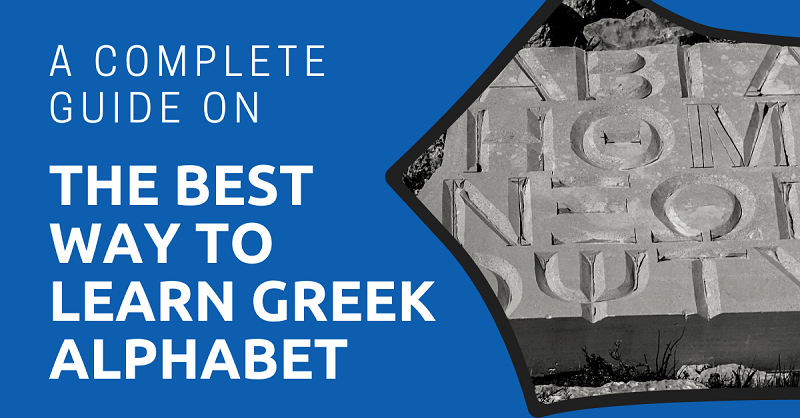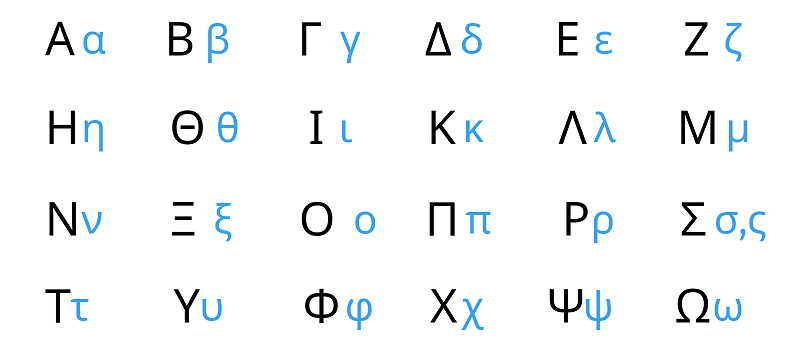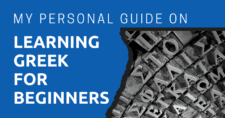
If you’re learning Greek as a beginner, you should probably start at the beginning — the alphabet.
Το Ελληνικό αλφάβητο, the Greek alphabet, evolved from Phoenician writing and has been around since 800 BCE. It’s the first alphabet to have both vowels and consonants, and it’s the predecessor to the Latin, Cyrillic, Armenian, Coptic, and Gothic writing systems, to name a few. I think that makes it safe to say that the Greek alphabet could well be the most important one in world history. So, why not learn it?
When I say learn the Greek alphabet, I don’t mean you have to sit down and learn to recite the letters in order like young children in primary school, usually while happily singing the “Alphabet Song”. But it’s important to learn how to pronounce the consonants, vowels, diphthongs (double vowel sounds), and double consonant sounds.
This way, you learn how to read, write, and understand spoken Greek, and how to pronounce Greek words more accurately.
This article will take approximately 8 minutes to read. Don't have the time right now? No worries. You can email the ad-free version of the article to yourself and read it later!
Disclaimer: This article may include links to products or services offered by ExpatDen’s partners, which give us commissions when you click on them. Although this may influence how they appear in the text, we only recommend solutions that we would use in your situation. Read more in our Advertising Disclosure.
Contents
Vowels and Consonants
Το Ελληνικό αλφάβητο has 24 letters total. It is composed of 7 vowels (α, ε, η, ι, ο, υ, and ω) and 17 consonants (β, γ, δ, ζ, θ, κ, λ, μ, ν, ξ, π, ρ, σ, τ, φ, χ, and ψ).
You will probably recognize many of the Greek letters, but you might not know how to pronounce them correctly. Here’s what each letter looks like written in Greek and how to pronounce them:

- Αα = άλφα = AHL-fah pronounce “α” like ah, as in the word alone
- Ββ = βήτα = VEE-tah pronounce “β” like v (not b), as in the word very
- Γγ = γάμα = GHAH-mah pronounce “γ” like a softly gargled gh or y
- Δδ = δέλτα = THEL-tah pronounce “δ” like the hard th sound in the word them
- Εε = ‘εψιλον = EHP-see-lohn pronounce “ε” like eh in the word ever
- Ζζ = ζήτα = ZEE-tah pronounce “ζ” like z as in zoo
- Ηη = ήτα = EE-tah pronounce “η” like ee as in seen
- Θθ = θήτα = THEE-tah pronounce “θ” like the soft th sound in three
- Ιι = γιώτα = YO-tah pronounce “ι” like ee as in seen
- Κκ = κάππα = KAH-pa pronounce “κ” like the letter k
- Λλ = λάμδα = LAHM-thah pronounce “λ” like the letter l
- Μμ = μι = MEE pronounce “μ” like the letter m
- Νν = νι = NEE pronounce “ν” like the letter n
- Ξξ = ξι = KSEE pronounce “ξ” like the letter x as in the word expect
- Οο = όμικρον = OH-mee-kron pronounce “ο” like oh
- Ππ = πι = PEE pronounce “π” like the letter p
- Ρρ = ρο = ROH pronounce “ρ” like the letter r
- Σσ/ς = σίγμα = SEEGH-mah pronounce “σ” like the letter s
- Ττ = ταυ = TAHF pronounce “τ” like the letter t
- Υυ = ύψιλον = EEH-psi-lohn pronounce “υ” like ee in seen
- Φφ = φι = FEE pronounce “φ” like the letter f
- Χχ = χι = HEE pronounce “χ” like a throaty ch as in the word challah
- Ψψ = ψι = PSEE pronounce “ψ” like the ps in the word chips
- Ωω = ωμέγα = oh-MEH-ghah pronounce “ω” like oh
If you’re wondering about the letters Σ σ ς (σίγμα) and why there is an extra letter, it’s because the third one, ς , is used at the end of a word. The other one, σ, is used within a word, but not at the end.
The good thing about Greek is that you pronounce words as they’re written (except for those that have diphthongs and double consonants, as we’ll show you later), emphasizing the syllable with the accent mark, like μωρό (mo-ROH) baby, μαμά (ma-MAH) mom, ψωμί (pso-MEE) bread, etc.
Now for some bad news. Unfortunately, there are multiple vowels for similar sounds in Greek. For example, ο and ω both sound like “o”; η, ι, and υ all sound like “ee”. When you use the different vowels depends on spelling and grammar rules which come later in your Greek lessons.
Try spelling these words in Greek based on their phonetic pronunciation, and don’t feel too bad if you don’t use the correct vowel in the spelling:
1. MEE-loh 2. GHA-la, 3. ka-FEH 4. ZA-cha-ri 5. Po-TEE-ri 6. ka-LOS (the answers are at the end of the article, good luck!)
How to Use Greek Letters to Learn More Words
As you learn the letters of the alphabet, you’ll also learn the diphthongs and double consonants. When you know these, you’ll be ready to read and pronounce any Greek word. This helps new learners build up their vocabulary.
Diphthongs
The word diphthong is Greek in origin: δίφθογγος means di – twice + phthongos – voice or sound (vowel). So, a diphthong is a sound that’s made when two vowels form a single syllable.
There are seven double vowel sounds in modern Greek:
- αι sounds like “eh” as in end. For example: παιδί (peh-THEE) which means child, or Αίσωπος (Eh-so-pos) or Aesop the famous Greek storyteller.
- ει sounds like “ee” as in see. For example: είναι (EE-neigh) which means it is.
- οι sounds like “ee” as in see. For example: οικογένεια (ee-koh-GEN-i-a) which means family.
- υι sounds like “ee-ee” as in hee hee. For example: υιός (ee-ee-OS) which means son.
- αυ sounds like “af or av” as in after or average, depending on the word. For example: αυτός (af-TOS) meaning him, αυγό (av-GOH) meaning egg, and Αύγουστος (AV-gus-tos) meaning August.
- ευ sounds like “ef or ev” as in efficient or ever, depending on the word. For example: ευχαριστώ (ef-char-ees-TO) which means thank you, or ευγενικός (ev-gen-ee-KOS) meaning polite.
- ου sounds like “oo” as in noon. For example: ουρανός (oo-rahn-OS) which means sky.
Double Consonants
The Greek language also contains double consonants used to produce sounds not represented by single letters. They are:
- μ + π = “b” as in μπαμπάς (ba-BAS) which means daddy
- ν + τ = “d” as in ντομάτα (Do-MAH-tah) which means tomato
- γ + κ = “ng” as in αγκίστρια (an-GIS-tri-a) which means hooks
- γ + γ = “ng” as in άγγελος (AN-ge-los) which means angel
- τ + σ = “ts” as in τσίρκο (TSIR-ko) which means circus
- τ + ζ = “tz” as in τζατζίκι (tza-TZI-ki) which means that delicious Greek sauce made from yogurt, cucumber, and garlic (tzatziki).
Here’s a great video to help you practice the double consonant sounds.
Extra Practice
Now that you’ve learned all about the diphthongs and double consonants, here are some more Greek words to practice using them:
First, the diphthongs. Try pronouncing the numbered words based on what you’ve learned so far. I have the phonetic spelling in the answer key at the end of the article. Good luck!
- αι 7. ναι (yes), Αίγυπτος (Egypt), 8. Αιγαίο (Aegean)
- ει είδος (kind or type), εικόνα (image), 9. είμαι (I am)
- οι οικονομία (economy), ποίημα (poem), 10. ποιος (who)
- υι υιοθεσία (adoption), ιδιοφυία (genius)
- αυ (av) αύρα (breeze), 11. άυριο (tomorrow)
- αυ (af) Αυστρία (Austria), Αυστραλία (Australia)
- ευ (ef) 12. ευχή (wish), ευφορία (euphoria)
- ευ (ev) ευαίσθητος (sensitive)
- ου Ουγγαρία (Hungary), 13. ούτε (neither/nor), 14. σκουπίδια (rubbish)
Now the double consonants. Try to pronounce each word based on what you know, then guess the meaning of the numbered words. Answers are at the end of the article.
μπλέ (blue), 15. μπανάνα, 16. μπύρα, 17. μπισκότο, κοντά (close to), άντρας (man), αγκαλιά (hug), έγκυος (pregnant), σαλιγκάρι (snail), 18. Αγγλία, αγγούρι (cucumber), στρογγυλό (round), ταράτσα (roof), 19. τσιγάρο, τσίχλα (chewing gum), τζάμι (glass of window), τζάκι (fireplace), 20. τζιν
Memorizing the Greek Alphabet
The Greek alphabet might seem a bit confusing at first glance, but it’s not that difficult to learn. Firstly, you probably already recognize a few of the letters even though you might not know the correct pronunciation. And secondly, there are only 24 letters to learn initially (we’ll get into the diphthongs and double consonants in a bit), so why not give it a try?
Here are some helpful tips for learning Το Ελληνικό αλφάβητο:
1. Break it up into smaller parts. Maybe go for six letters per day. It’ll only take you four days to get through all 24 letters.
2. Practice writing the letters, both the capital and small form. While you’re writing, pronounce the letter out loud. This video can help you learn how to write and pronounce each of the letters. The presenter in the video also gives you a Greek word beginning with the letter you’re learning, which is a great way to remember the letters easier.
3. Write the letters on flashcards after you’ve learned how to write and pronounce them well, then practice saying them out of order.
4. Have a friend test you a couple times, both orally and written.
5. Start reading and writing easy words in Greek. Write them on your flashcards and practice them in random orders.
6. Practice makes perfect!
GreekPod101 has great videos to help you practice letter pronunciation. They use native Greek speakers who are professional educators too. This ensures that you are getting high quality practice and correct information about the language.
Now, on to You
Learning how to pronounce Greek letters, diphthongs, and the double consonants, as well as recognizing which syllable to emphasize, is a strong beginning towards learning Greek fast and fluently. Not only will you be able to write letters and words, but you can also read them, pronounce them correctly, and understand someone speaking.
Be sure to write your new words in Greek on flashcards as you build your vocabulary. Don’t forget to add all the words you’ve learned from this article, too.
When I began learning Greek, I started with the alphabet and used the book: “Modern Greek Grammar Notes for Absolute Beginners” by Maria Poulopoulou. She begins the book with lessons on the letters of the alphabet, pronunciations, and other helpful tips.
These days, there are many great videos like this one that can help you learn faster and more accurately.
I also recommend GreekPod101 for online learning. Their lessons are clear, concise, and informative.
Have fun learning, and kαλή τύχη (good luck)!
**Answers: 1. μήλο (apple) 2. γάλα (milk) 3. καφέ (coffee) 4. ζάχαρη (sugar) 5. ποτήρι (glass) 6. καλός (good) 7. NEH 8. eh-YAY-oh 9. EE-meh 10. pee-os 11. AHV-ri-o 12. ef-HEE 13. OO-teh 14. skoo-PEE-di-a 15. banana 16. beer 17. biscuit 18. England 19. cigarette 20. gin






